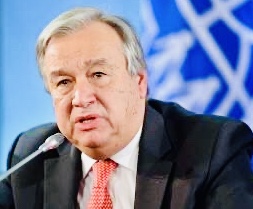Photo: Antonio Guterres, UN boss.
Israel-Gaza crisis: Egypt, fundamental pillar of hope – UN chief
UN Secretary General, António Guterres, says Egypt is today the fundamental pillar that allows hope to exist on that side of the border, hope that trucks will move to support people in the troubled region.
Guterres, who said this in Egypt on Friday in front of the gates at the Rafah crossing to get lifesaving aid moving, expressed his gratitude to the people and the government of Egypt.
“Hope that the food, aid and the medicines I have seen in a plane that has landed will also go to the people that need it.
“Hope that there will be a future and hope that one day there will be peace with a two-State solution, with Palestinians and Israelis living in peace in two States, one side by the other,” he said.
In a passionate speech standing just a few metres from the Egyptian side of the crossing, he pointed behind him and spoke of the two million trapped without sufficient supplies now for nearly two weeks.
“We are witnessing a paradox: behind these walls we have two million people that are suffering enormously, have no water, no food, no medicine, no fuel, that are under fire, that need everything to survive,” he said.
“On this side,” he continued, indicating the convoy carrying lifesaving supplies, “we have seen so many trucks loaded with water, with food, with medicines – exactly the same thing that is needed on this side of the wall.
“These are a lifeline. They are the difference between life and death for so many people in Gaza.
“To see the convoy stuck at the border makes what needs to happen very clear.
“What we need is to make them move, to make them move to the other side of this wall, to make them move as quickly as possible and as many as possible,” the UN chief added.
According to him, UN is now actively engaging with all the parties related to conditions set for cross-border aid deliveries in the Israel-United States announcement and the related Egypt-Israel agreement.
“We absolutely need to have these trucks moving as quickly as possible and as many as necessary.
“We are not looking for a win. We are looking for convoys to be authorised in meaningful numbers (and for) trucks to go every day into Gaza to provide enough support to the Gazan people.
“It was absolutely essential to solve these problems quickly,” he said, reiterating his appeal for a humanitarian ceasefire.
“It is impossible to be here and not to feel a broken heart,” he said, adding that he hoped the food aid and medicines he had seen on planes arriving would serve the people that needed it most.
The UN chief arrived on a cargo plane carrying 65 tonnes of humanitarian supplies including food donated to the World Food Programme (WFP) tarpaulins from the UN migration agency (IOM) and trauma kits from the World Health Organisation (WHO).
Meanwhile, briefing reporters in Geneva on Friday, UN humanitarian affairs coordination office (OCHA) spokesperson, Jens Laerke, said on behalf of UN relief chief Martin Griffiths, “we are in deep and advanced negotiations.
“We are in advanced negotiations with all relevant sides to make sure that an aid operation into Gaza starts as quickly as possible and with the right conditions.
“We are encouraged by reports that the different sides are nearing an agreement on the modalities and that the first delivery is due to start in the next day or so.”
Aid trucks have been waiting at the Rafah border crossing since Saturday. Laerke stressed that while it was necessary to “provide aid to everyone in Gaza regardless of where they are,” Rafah was “the lifeline” which would offer the most direct route to reach people in need.
In response to questions regarding the limited scope of the initial operation, Laerke underscored that it was still under negotiation but that “any trucks that go in would be more than no trucks.”
He also said in addition to food, water and medicines, fuel was desperately needed in Gaza as the enclave was under an electricity blackout.
“Fuel is a life-saving humanitarian commodity in this crisis,” he insisted.
In an update after 13 days of hostilities, OCHA said according to the enclave’s de facto authorities, the death toll in the Gaza Strip has reached 3,785, including at least 1,524 children, while over 12,000 have been injured.
OCHA said, “hundreds of additional fatalities” are believed to be trapped under the rubble, as “relentless bombardments” of the territory continues.
OCHA also said since Oct. 7, 1,400 people have been killed in Israel and over 4,600 injured, according to official Israeli sources.
At least 203 people are held captive in Gaza, including Israelis and foreign nationals, as per Israeli estimations. (NAN)







